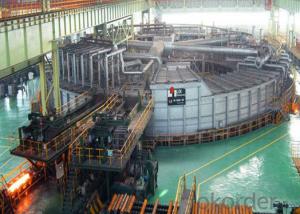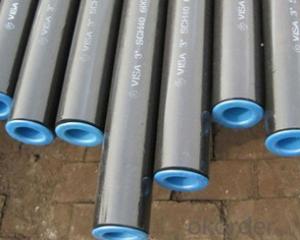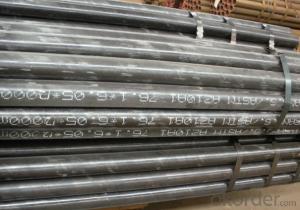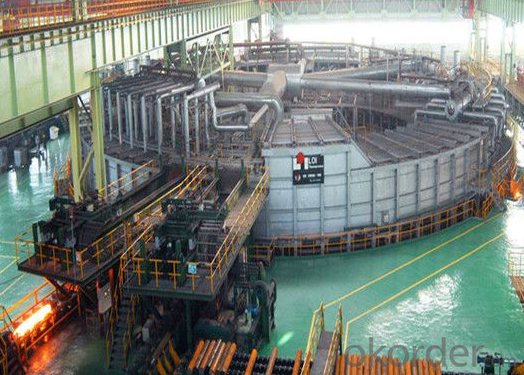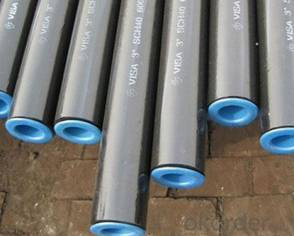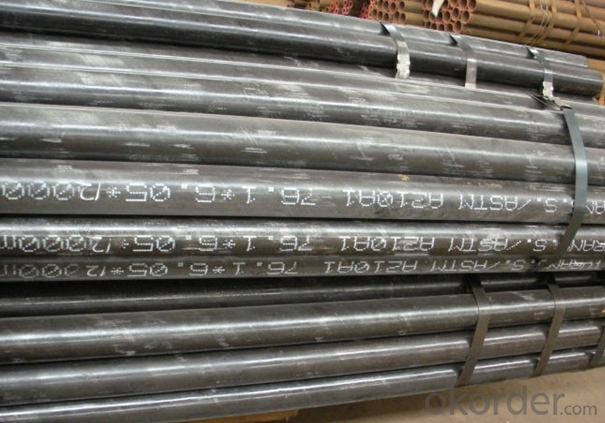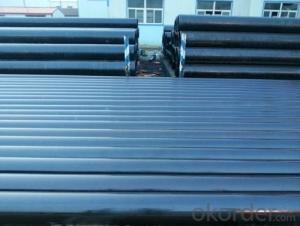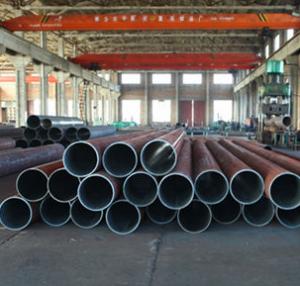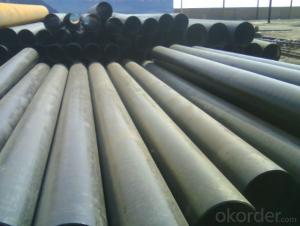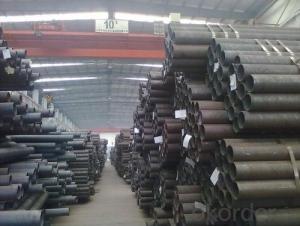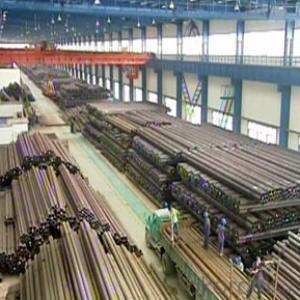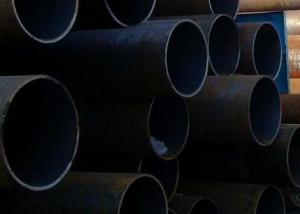High-quality Carbon Seamless Steel Pipe For Boiler A53(A,B)CNBM
- Loading Port:
- Qingdao
- Payment Terms:
- TT OR LC
- Min Order Qty:
- 10 pc
- Supply Capability:
- 30 pc/month
OKorder Service Pledge
OKorder Financial Service
You Might Also Like
Quick Details
| Thickness: | 3 - 60 mm | Section Shape: | Round | Outer Diameter: | 21.3 - 1220 mm |
| Secondary Or Not: | Non-secondary | Application: | fluid pipe,boiler pipe, structural pipe, oil/gas/water pipe etc | ||
| Technique: | Hot Rolled | Certification: | ISO9001-2000, ISO14000, ISO18000 , API 5L | Surface Treatment: | Painted, Oiled, galvanized or phosphate etc |
| Special Pipe: | API Pipe | Alloy Or Not: | Is Alloy | Technique:: | Hot rolled or cold rolled |
| Special pipe:: | API/ ASME/thickwall/oil/gas/water pipe | Length:: | 3-12m | Treatment of two ends:: | Beveled end , plain end etc |
| Brand:: | Bai Chuan | Third Party Inspection:: | BV, SGS etc. | Schedule:: | SCH10-SCH160, XS, XXS |
| Other Material:: | 10#, 20#, 16Mn, Q345 etc | Material Type:: | Carbon steel/ Low alloy steel | Producing standard:: | American/Japanese/ German/ Britain/ Chinese standard |
| Grade: | A53(A,B),A106(B,C),A210,API J55,St37,STPG42,A53-A369,API J55-API P110,ST35-ST52 | Standard: | BS EN10296,JIS G3452-2004 |
1. Out Diameter: | 21.3mm-1220mm |
2. Wall Thickness: | 3mm-60mm |
3. Length: | 3m-12m |
4. Producing Standard: |
|
5. Main Material: (Carbon Steel & Low Alloy steel) |
|
6. Special specifications: | Available according to customer’s requirements and quantity. |
7. End Shape: | Beveled end , plain end, varnished, or adding plastic caps to protect the two ends as per customer’s requirements. |
8. Surface treatment: | Painted, Oiled, galvanized, phosphate etc. |
9. Usage: |
|
10. Certificates: | ISO9001-2000, ISO14000, ISO18000, API 5L certificate |
11. Third party inspection: | Welcome you to send a third party inspecting company (BV, SGS etc) to check the quality of our final products. |
12. Pictures: | our producing flow chart, our factory, production line, inspecting equipments, our products are listed below for your reference. |
- Q: How are steel pipes used in tunnel construction?
- Steel pipes are commonly used in tunnel construction for various purposes such as drainage, ventilation, and support. These pipes are installed to facilitate the removal of water from the tunnel, ensuring a dry working environment. They also serve as conduits for supplying fresh air and removing exhaust fumes. Additionally, steel pipes are utilized as structural supports, providing stability and reinforcement to the tunnel walls and ceilings.
- Q: What is the difference between internal and external coating for steel pipes?
- Internal coating for steel pipes refers to the application of a protective layer on the inner surface of the pipe. This coating is primarily used to prevent corrosion and to enhance the pipe's resistance to various chemicals present in the fluid being transported. The internal coating is typically applied using techniques such as spraying, brushing, or dipping, and it can be made of various materials such as epoxy, polyurethane, or cement mortar. On the other hand, external coating for steel pipes involves the application of a protective layer on the outer surface of the pipe. The purpose of this coating is to provide protection against environmental factors such as corrosion, abrasion, and impact. External coatings are usually applied using methods like wrapping or coating with materials like polyethylene, fusion-bonded epoxy, or asphalt enamel. In summary, the main difference between internal and external coating for steel pipes lies in their location and purpose. Internal coatings protect the inner surface of the pipe against corrosion and chemical attacks, while external coatings safeguard the outer surface from environmental damage. Both types of coatings are crucial for ensuring the longevity and reliability of steel pipes in various applications.
- Q: Can steel pipes be galvanized?
- Yes, steel pipes can be galvanized. Galvanizing is a process of applying a protective zinc coating to steel or iron to prevent corrosion. The steel pipes are submerged in a bath of molten zinc, which forms a metallurgical bond with the steel, creating a corrosion-resistant coating. Galvanizing is commonly used in various applications, such as plumbing, construction, and outdoor structures, to extend the lifespan of steel pipes and prevent rusting.
- Q: How are steel pipes tested for leakage?
- Steel pipes are typically tested for leakage using various methods such as hydrostatic testing, ultrasonic testing, or dye penetrant testing. Hydrostatic testing involves pressurizing the pipe with water or another suitable liquid to a predetermined level and checking for any pressure drop over a specific period of time, indicating potential leakage. Ultrasonic testing utilizes high-frequency sound waves to detect any defects or cracks in the pipe wall that may cause leakage. Dye penetrant testing involves applying a colored liquid to the surface of the pipe, which seeps into any cracks or openings, making them easily visible under specific lighting, thus identifying potential leaks.
- Q: What are the common methods for joining steel pipes?
- Different methods exist for joining steel pipes, depending on specific applications and requirements. Some commonly employed techniques include the following: 1. Welding: Among the most frequently used methods to join steel pipes, welding involves heating the pipe ends and applying pressure to fuse them. Various techniques can be employed, such as arc welding, MIG welding, TIG welding, and even laser welding. 2. Threaded connections: This method involves threading the ends of steel pipes to create male and female connections. These threaded ends are then screwed together using pipe threads. Threaded connections are typically utilized for smaller diameter pipes and in low-pressure applications. 3. Flanged connections: Flanges are employed to join steel pipes in situations that necessitate easy assembly and disassembly or frequent maintenance. Flanges are flat, circular discs with bolt holes that allow for the bolting of pipes together. They offer a robust and leak-proof connection. 4. Compression fittings: Compression fittings enable the joining of steel pipes without the need for welding or threading. They consist of a compression nut, compression ring, and compression sleeve. The nut is tightened onto the sleeve, compressing it against the pipe and creating a secure connection. 5. Grooved couplings: Mechanical connections are created with grooved couplings, which are utilized to join steel pipes. The pipe ends are grooved, and a gasket is inserted between the grooves. The couplings are then tightened, compressing the gasket and forming a tight seal. 6. Soldering or brazing: These methods involve the use of filler metal with a lower melting point than the steel pipes. The filler metal is heated and melted, allowing it to flow between the pipe joints and create a bond. Soldering is generally suited for smaller diameter pipes and low-pressure applications. Each joining method has its own advantages and limitations. The appropriate method for joining steel pipes depends on factors such as pipe diameter, application, working pressure, and required joint durability. It is crucial to consider these factors and consult industry standards and guidelines when selecting the suitable joining method for steel pipes.
- Q: How are steel pipes used in the water supply system?
- Steel pipes are used in the water supply system to transport and distribute water efficiently and safely. They are durable, corrosion-resistant, and have a high carrying capacity, making them ideal for transporting large volumes of water over long distances. Steel pipes are commonly used for mains and transmission lines in water supply networks, ensuring a reliable and steady water flow to homes, businesses, and industries.
- Q: Can steel pipes be used for underground drainage in acidic soils?
- When considering underground drainage in acidic soils, it is important to take certain factors into account. The use of steel pipes can be suitable for this purpose, but there is a risk of corrosion over time which may weaken the pipes and potentially lead to failure. To minimize this risk, it is recommended to opt for galvanized steel pipes that have been treated with a protective coating to resist corrosion. Regular inspection and maintenance are also essential to promptly address any signs of corrosion or deterioration. Moreover, it is worth exploring alternative materials like PVC or HDPE pipes, which have greater resistance to corrosion in acidic environments. Ultimately, the choice of material should be based on a comprehensive evaluation of the soil conditions, expected lifespan of the drainage system, and budgetary constraints.
- Q: Which is cheaper, angle iron or steel pipe?
- Angle called angle, the steel strip is perpendicular to each other on both sides into the corner. There are equal angles and unequal angles. The two sides of an equal angle steel are equal in width. The specifications are expressed in millimeters of edge width * edge width * edge thickness. Such as "/ 30 x 30 x 3", that is 30 mm width equal angle, edge thickness of 3 mm. Also available models that model is the number of centimeters wide, such as angle 3#.
- Q: How are steel pipes used in the manufacturing of shipbuilding?
- Steel pipes are widely used in shipbuilding for various purposes such as the transportation of fluids, gases, and air systems, as well as structural applications. They are commonly used for the construction of ship hulls, bulkheads, and decks, providing strength and durability to withstand the harsh marine environment. Steel pipes are also used in the installation of various systems onboard, including fuel, water, and sewage systems, as well as ventilation and firefighting systems. Overall, steel pipes play a vital role in the construction and operation of ships, ensuring their functionality and safety.
- Q: What does "buried steel pipe" 6*2SC100 mean?
- The embedded steel pipe 6*2SC100 refers to a welded steel pipe with 2 pipe thicknesses of 6mm and a diameter of 100mm. SC pipe means welded steel pipe. Embedment means pre installation (burial).
Send your message to us
High-quality Carbon Seamless Steel Pipe For Boiler A53(A,B)CNBM
- Loading Port:
- Qingdao
- Payment Terms:
- TT OR LC
- Min Order Qty:
- 10 pc
- Supply Capability:
- 30 pc/month
OKorder Service Pledge
OKorder Financial Service
Similar products
Hot products
Hot Searches
Related keywords
